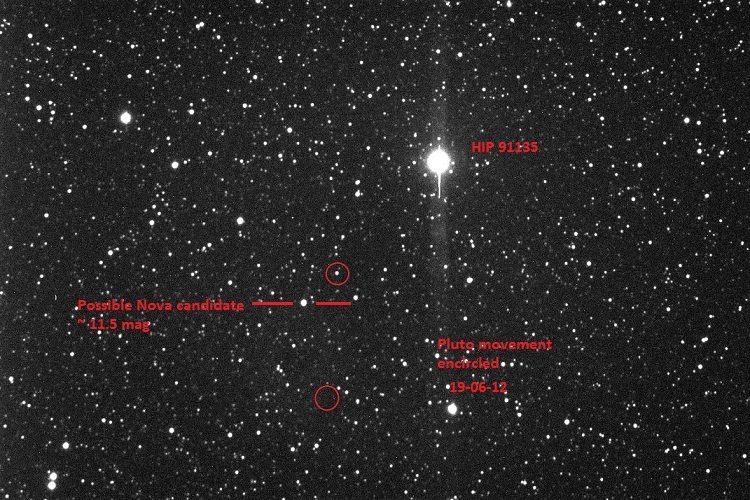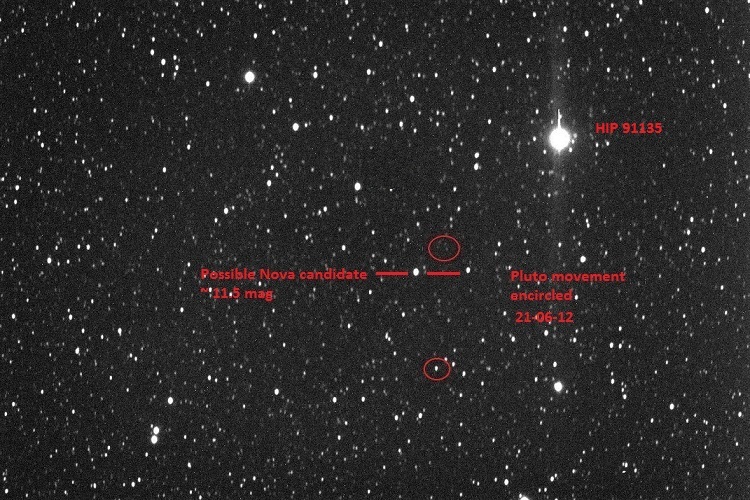Full-time amateur astronomer from Bangalore
An astronomer by heart, who wishes to hand out his passion to others. Deeply fascinated by comets he decided to compile an encyclopedia about history of comet hunting. Recently he has started promoting astronomy tourism in a beautiful Indian sky spot. He wishes to push up the status of amateur astronomy in India from a hobby to something at a more profound level. Full-time amateur astronomer, Amar A. Sharma.
When and how did you first encounter astronomy?
It was around high school, in the year 1999-2000 that for some reason I got inclined towards the sky & astronomy. We also had a small chapter in our science in 10th grade. Back then I would collect hundreds of newspapers related to astronomy. This was a youngster's blossoming interest which needed further direction. It was after a visit to the city's planetarium that I found channels in life opened. It is here that I met an amateur club and a senior professional astronomer lady (current director) both who introduced me to the night sky and facilitated my practical awakening towards the stars.
But as a highly devout Indian, I find an even subtler answer for my story. I would say it was more of a spiritual connection and there was no external reason for me to get into astronomy. It was already within the inside waiting to manifest outside; this was realized in recent years.
What was your dream profession in childhood, have you ever dreamed of being professional astronomer?
In early childhood it was many things that kept changing with time - you know the bubbling school days. I was fascinated by subjects like wildlife, history, geography, etc. During my college days when I got into astronomy and into comets, for a brief period of time (a year or two) I did have a thought that if I ever get into professional astronomy it would be a post-doctorate in comets. I wanted to be a professional comet researcher, if ever that was to be my story.
But life had other plans for me, and it was far from any academics. I wanted to make a living by staying under the night sky, by observing comets & other celestial objects, and someone to pay me for that as an amateur (!). And that was outrageous, it was a very fragile state for a youngster who was around 20-21 whose career had just begun and had to survive in the society with this kind of an unrealistic dream.
Amateur astronomy was to be my only path. In spite of whatever singular-most terrible struggle I have gone through to survive, today I can only see happily that I have another day of astronomy to do in spite of the ongoing struggle. And that's what I am living for.
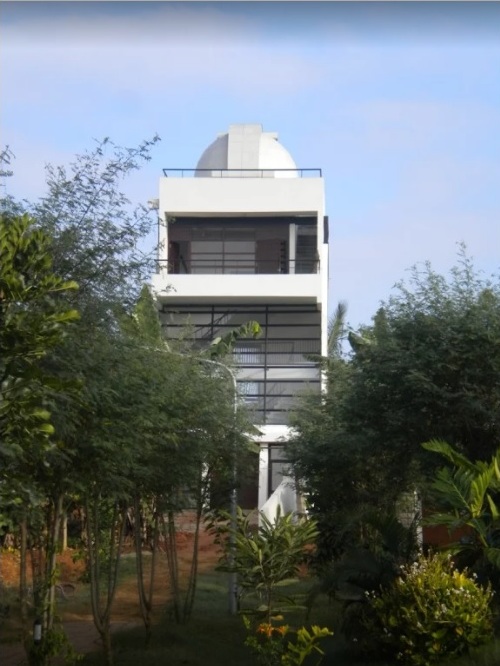
You worked for 4 years in a private observatory outside Bangalore, called Nikaya Observatory, for public outreach, but you ended up there.
So what do you do for living?
A startling answer here. I am a full-time amateur. I have to survive on my astronomy activities, mainly outreach, as primary income. As a freelancer I try to reach out to schools & some colleges for guest presentations. But I have a storehouse of ideas trailing behind me, all these projects which will also make for additional income. Whenever they manifest, that is.
Most passionate amateur astronomers long to discover something new, and some even succeed. How was it with you?
Having dreamt since my beginning days of astronomy to hunt & discover comets, I found myself wanting to do what others achieved - at any cost. A private observatory with equipment had been the chant on my tongue - apart from wanting comets - since I was in my late teens. I found a particular fondness in this sect of amateurs, those who were linked to comets. As a technologically non-savvy person, I fell in awe when I went deeper into lives of those who hunted for comets during the pre-80s era, when internet was not invented and when telegrams were used to communicate discoveries.
The earlier you go, the more you discover the immense struggle and "personal touch" those amateurs exhibited towards their love for comets. The veteran comet hunters, who at the time of writing should be aged around 85+ years, particularly touched my heart. Names like late Albert Jones (NZ), late George Alcock (UK), Tsutomu Seki (Japan), late William Bradfield (Australia), the many Japanese, and others. One aspect we imbibe from their lives is the more they did, the least they ever said they have done a lot; such humility. According to me, they all lived through the classical era of visual comet hunting, a time which is now not going to come back and is lost forever, a time which I wish I were a part of!
So yes, finding new celestial objects - especially comets - is next to breath for me. And I want to accumulate this “wealth” in large proportions.
Do you remember what triggered your interest in comets?
Don’t recall details exactly. It was meant to be. I had just seen Hale-Bopp from my hostel outside a city and only remember it as a fuzzy spot; it was few years before entering into astronomy seriously. During my very beginning days in 2002 when I did not even know what comets are, I saw a newsletter at a local star party which mentioned any Indian discovering a comet in the next 5 years would get a cash prize of Rs. 100,000 (cca 2500 USD). This appeared a good news, but something not powerful enough to catapult one into a lifelong career into comets.
At the same star party I saw my first comet Ikeya-Zhang shown by a volunteer. The next I remember is by 2003 I had already been bitten very hard by the comet bug; so hard that the rest of my affair with comets is history. So the answer would be comets were supposed to be the path of my life, due to inner reasons. It just had to shape up by itself.
I downloaded every single information I would come across on comets 2003 onwards. I followed every single comet in the sky ever since, even under cloudy nights. I looked upon every comet amateur as someone I revered and wanted to become. Comets were already like a holy grail for me.
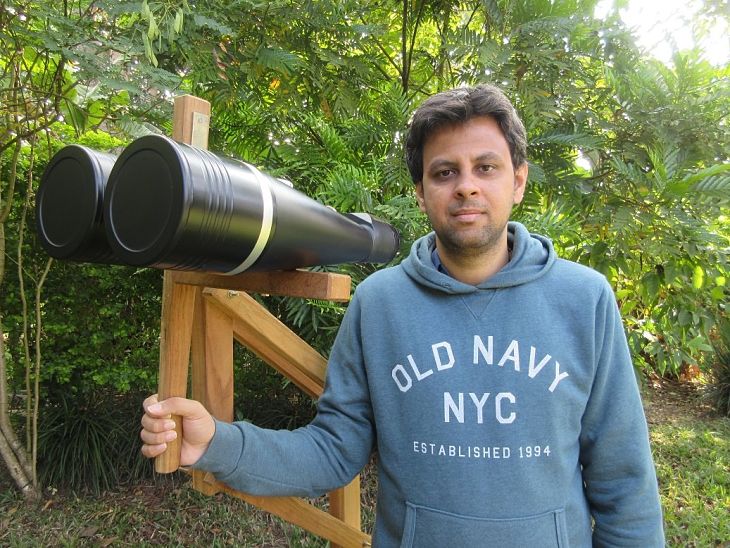
You are deeply fascinated by comets and comet hunters, after you had collected enormous data about them, you decided to compiling a book on
this topic. Why?
Comet hunters are treated with respect by anyone who's not into comets - because they associate that tiny sect of humans with values like patience, determination, perseverance; this everyone knows. But do we know much about them? How much on the inside do we know?
In mid-2012 by a very strong urge, I happened to embark on biographies of all comet hunters & discoverers for a large encyclopedia. I spent 10-12 hours everyday compiling about their lives and contacting dozens of comet people for the work.
For 1 year I was working on the history of comet hunting and biographies of nearly every comet hunter & discoverer over the last 2 centuries, covering not just that but other areas related to topics like comet awards, comet discovery stories, special passages on comet persons.
Parallel to this was a deep desire to make a documentary film featuring every single comet hunter (somehow) in that program; this ensued for quite a long time. I contacted lot of professional bodies & MNCs for funding, but to no avail.
Japanese discoverers belongs to your most appreciated hunters. Tell us something about them.
During the first phase of my comet biography compilation life started with Japanese hunters, and it all started with Minoru Honda. I was impressed by his hunting of a comet from the middle of a battlefield in Singapore at night when others were asleep, and he would head out hunting with a make-shift telescope he made from a disposed lens and tube. He had no star chart. In May 1942 he saw something in that primitive-quality scope that looked like a comet, he confirmed it without a star chart by noticing it slightly displaced its position a day later, and believed that´s a comet. Now getting the word out for its identity confirmation was difficult, as it was wartime, and certainly no place to talk about a comet finding in the sky. But his superior was gracious enough to spread the word out of the battlefield and let it eventually reach Tokyo Observatory. It was confirmed in the USA. It was finally identified as the return of periodic comet Grigg-Skjellerup, and he having recovered it under those circumstances sets him exemplary as a determined comet hunter.
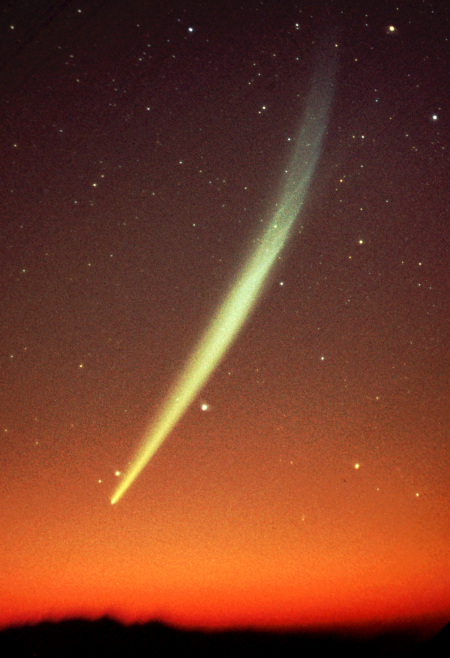
I would call the Japanese as samurais for comet hunting; they were always there on the field; if not this hunter, there was another one. The total number of Japanese new comet discoveries during the 20th century (from the first one in 1931 till 2016) was 71, with a staggering 51 different Japanese individuals participating in new comet (one or multiple) discoveries.
They have created records which I doubt anyone can break. On the morning of May 1, 1968, six Japanese discovered the same comet around the same time, approximately 4 am. The intruder C/1968 H1 Tago-Honda-Yamamoto was discovered slightly west of M31 (Andromeda galaxy) at 6-7th magnitude. Well, there was even a successor to this event! On the night of October 5, 1975, in a span of 1 hour 20 minutes between 17:50 UT & 19:10 UT, eight only-Japanese comet hunters individually chanced upon 2 new comets, Comet Mori-Sato-Fujikawa & Comet Suzuki-Saigusa-Mori. Not the end of the story yet. Hiroaki Mori among them discovered two comets just 70 minutes apart!
You popularized astronomy through several astronomy forums for years by writing numerous articles there. There is no doubt, you have a great talent for writing.
The website of American magazine "Sky and Telescope" published your obituary of Albert Jones. And it was followed by more articles later. Was it so simple, that you proposed them your writing and they accepted it right away?
Obituary is a report about passing of someone, and that news has to spread immediately. Two days later publishing it would be not apt, since it has to be timely. The New Zealander comet hunter-discoverer Rodney Austin mentioned to me in an email about passing away of his good, senior friend, Albert Jones. Rod would have mentioned it to me because he knew how much I was pressing on meeting Jones. Jones and other veterans were so close to me, he knew well. So he considered his duty to let me know of the passing of the legend.
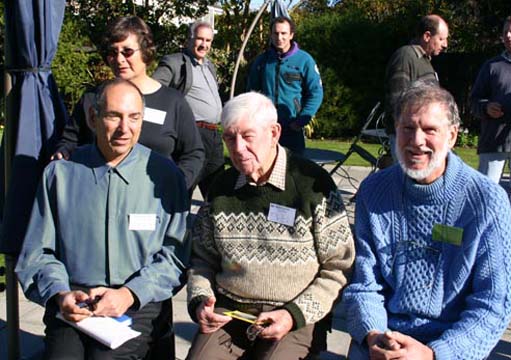
But thankfully, much before, I had already reached out to Albert Jones through email. He had written back two or so emails to me, aged 91. Jones was one of the most special persons in my life during that period, even though I had practically no connection with him. I had my first version of chapter on Albert Jones already compiled for the encyclopedia I was working on. It struck me immediately why not compile an obituary since he's passed away and notify the astronomy community through the web. There was no reason for me coming up with that thought, it was out of the blue. I sat through and contacted S&T chief editor Robert Naeye over email and put forward this. I believe they took me, a newcomer to them from India, on faith, because after all I had come up with an Obituary of Albert Jones, and it had to sound genuine - no one would dare to contribute what does not exist - and I must have introduced myself as someone working on this topic.
So success does not come into picture here. Becoming a regular contributing author for these established magazine websites is another thing; that´s where success will come in.
Last year you focused on Astronomy Tourism. What is your vision?
Life brought yet one more new feature to me a year ago and I have been vehemently working on that. Astronomy Tourism. I started my own private venture called "Skyward with AstronAmar". My primary vision is to make the world one stage of astronomy: amateurs from different lands collaborate, and newcomers participate to experience it.
Having contacted nearly one hundred & fifty Indian schools over email, and others - with barely 1-2 positive responses in return - I want them to experience the world's astronomy the way we blessed ones know of: astronomy farms, dark sky parks & reserves, large apertures, ccd cameras, advanced amateur astronomy. Indian schools are currently on a rage to visit NASA, and that´s the only tour that´s happening linked with astronomy. They do not know life outside NASA and recreation (the nearby Disney World). They are actually missing out on things they have no clue about; so unfortunate I feel. That´s my current, ongoing, vision for Indians: to make them all involve in what we are so lucky to know of. It is getting to be a challenge - not just a challenge but in fact it´s like working against the flow of the society - trying to get such a profound but unknown field to a commoner, and it seems to me people in this land are still not ready for such a "spiritual" thing that can change their life forever, because astronomy is only "star gazing" for one, else astrology.
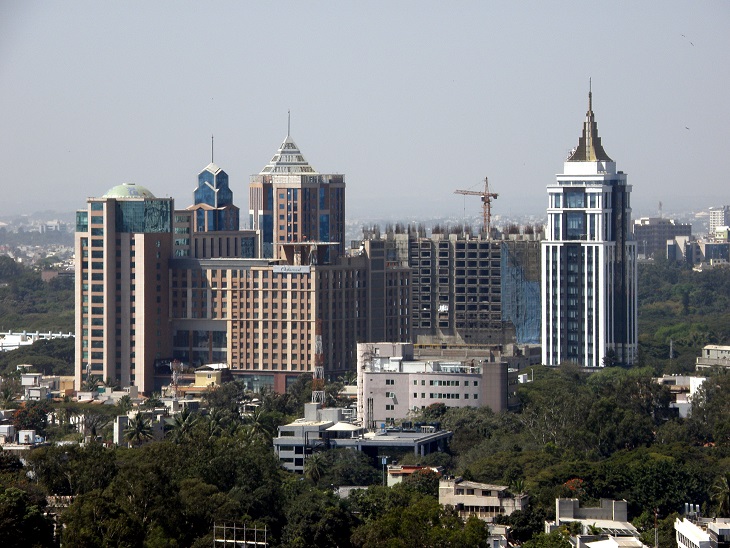
You prepared your astrotours both outward and inward. After reading your tour schedule to South Africa or Australia, they looked very tempted, but only for really passionate amateur astronomers. Is it affordable for Indian astronomy enthusiasts?
It is my observation of the last couple years that things are not in India like before. The standard of living has become staggeringly high. Lot of people possess the money. Today you will find a sudden upsurge in numbers of an upper income strata who are living in posh apartments and own more than one car. Many tens of thousands of children go to rich international schools. Affordability is not the question nowadays keeping these people in mind. A person spends on only what suits them. An Indian of today (this class we are talking about) can even afford sending their children every year for an international tour. The middle income classes that have remained the same may not be able to afford, but it´s not that even they cannot afford; some smaller schools also have made international tours to NASA or other Asian countries for casual tours.
So the money is there with Indians nowadays. 9 out of 10 people today are software engineers or something else that is common. Our society, as I see it, is entirely absorbed in chasing luxuries & comfort, in sightseeing. Everyone does what others do, one will typically not dare to enter unknown environs. To me it is quite shameful to see the number of people interested in photography, trekking & wildlife.
The number of youngsters & techies launching their tourism start-ups in the last year or two will take you by surprise. On the other side it makes you think with so many business outlets open sure there must be customers (travelers), which means people from somewhere are getting the money to spend for travel alone. It become a booming business. Astronomy is a thing for the books, for them. Astronomy is a subject pursued by scientists, even for the educated classes. Astronomy as we know it is simply not out in the open. They aren´t aware of the word "amateur astronomy" and the kind of lifestyle in it.
If you will find 500 people interested in photography, 300 people interested in trekking, 300 people interested in wildlife, but in that ratio 10 laymen just interested in astronomy and not doing anything more than a hobby (not talking of the dozen amateur astronomers that exist who are doing little more than that). As one who works for public outreach itself and meets new people to spread astronomy, I am troubled at the kind of questions that come to me about astronomy - it is that bad. What about the joy that WE know of, of dark skies, astronomy farms, go-to telescopes, ccd cameras, imaging supernovae, chasing 15th magnitude galaxies, etc. Where does that head out amongst public except for being withheld amongst us?
Indians by large are currently not ready for astronomy tourism. Such a profound area of life is still in cocoon stage, waiting to erupt one day. I really hope the society gets up from their comfort zone, heads out to the night sky, and becomes receptive to the kind of amateur astronomy we experienced folks want to bring to them. That day I will like to take complete credit for making Indians aware of astronomy tourism. I have struggled very bad in the last one year alone trying to show people the path. You do photography & trekking & safaris for sensual pleasure, what is the ultimate output from it? Profundity in life is far needed to make one reach the higher goal than the current stagnation of materialism & enjoyment. It is only in the human body can one become more spiritual because we have acquired the consciousness to probe deeper into the vast Creation. This (astronomy tourism) is that chance that takes you to such parts of the globe and reveals to you such sights of Nature "out of the world" in its literal sense, and ultimately makes you face-off with the quintessential questions of our own non-existent existence on this planet against the enormity of the Creation.
Your inward tours will get visitors to 3 different Indian states: Karnataka, Rajasthan and Maharashtra. What could attract foreign astronomy lovers in these destinations?
I reside in the southern Indian state of Karnataka with Bangalore as capital and you have southern skies here. This is an interesting feature for residents of northern hemisphere like in Europe, USA or Russia. In the Rajasthan state (northern India) residents of southern hemisphere would have gotten northern skies which they would not get in Australia, New Zealand or South Africa. In Karnataka you have the pristine, large, forest range called Western Ghats and beautiful dark skies (Bortle 3). In Rajasthan you have the expansive Thar Desert and very good dark skies. In Maharashtra program (central India) I dont think we will get as dark skies, but it will be compensated by a view of the large Lonar Meteorite Crater, which at 1.8 km diameter is even bigger than the world famous Barringer Meteor Crater, at around 1.1 km.
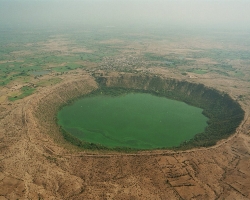
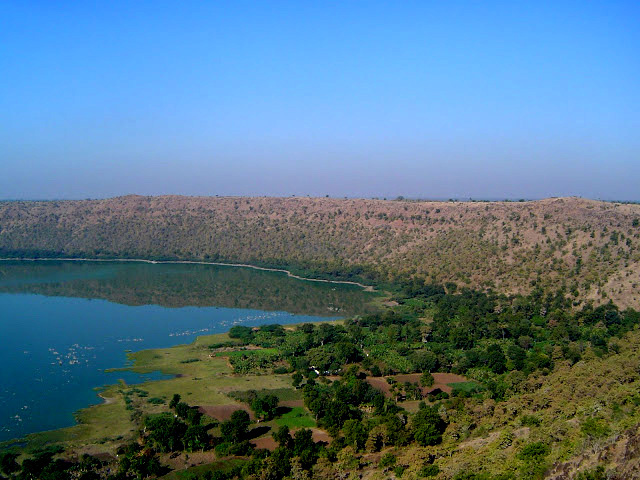
In all 3 states, the tourist would get a chance to experience more of touring India, as much as they would have through any tour operator. But traveling with an astronomer you will get to interact more of astronomy.
It is a matter of choice who wants to experience astronomy along-with seeing India. And this way I hope several amateur clubs & individuals from over the world come over to India and we develop better ties and plan for some joint collaborative activities. Tying up with amateurs from corners of the globe was one of my early day wishes; I have always been inspired by the kind of astronomy they do. And as said earlier I want astronomy to become a common world stage through me.
David Levy, a renowned Canadian comet hunter named one of his discoveries after you. So asteroid 2004 TV69 has been named (380607) Sharma. What did you feel when you learned about it?
When I got to know about it I was naturally frozen. It was kind of a suction inside! How could this happen, it was a terrifying surprise, a harsh awakening. It was "way too early to happen" was the thought all over me.
I well knew then it was something someone acquired towards the end of their career - as a token of gratitude by the asteroid discoverer on behalf of the astronomical community, thanking them for their work. And all those personalities after whom an asteroid was named I would generally come across during my literary research were aged above 60, after they had contributed their invaluable careers to us. I had only completed a decade; it was the beginning of my career against those luminaries; and this is a special case. I had done no work in / for astronomy, but I was a struggler of my own kind with a ton-worth of things ahead of me - which would have possibly qualified me for the asteroid naming someday in the future. Therefore, not really for any significant work per se, but for that struggle only I know of, this asteroid was a reward for. What I was supposed to acquire in the future, I got it in my past.
I felt David Levy played a role of a messenger of the gods, gods who saw my oneness with astronomy for the last decade, and the incessant, never-dying, always unfulfilled, calls; calls of longing towards the night sky, calls towards spending a career in comets, recent calls of making students & adults passionate about astronomy, sacrifices not in the books of a human, and what-else-not.
For me this naming is equivalent of an astronomical lifetime achievement award. This was the least expected! It is only a reward to serve a bigger cause. You can head out and even expect for yourself you want a supernova in the sky, and at least stay behind it. But someone, especially someone of the likes of the legendary Levy, watching you from behind-the-scenes and confers a greatest honor in the astronomy field is not something you can ask for - you can´t ask to nominate yourself for the good work. I have thought - and written in a polished way in my upcoming book's chapter on hunting celestial objects - anyone can get a medal or tangible accolade, or even have a street named after you. Only astronomy grants you that accolade wherein a celestial object, several astronomical units or light years away, can be named after you - something that "belongs" to you that you can´t even touch. What irony! What I have mentioned in the chapter is all these terrestrial accolades & remembrances are going to fade away one good day, but the celestial imprint stays on, forever, even after human consciousness is long gone. All terrestrial accolades are to be remembered by humanity, who is here only for a transient, brief, period. The celestial imprint will be remembered by Mother Nature, irrespective of who remains behind or not, and actually when no one does stay back in any realm of consciousness.
Here in central Europe we do not know much about Indian astronomy, can you introduce it for us in a few words?
If we talk about Indian astronomy, there are two parts to it. The very rich ancient astronomy of the period much Before Christ, as much as 5000 years in the past. The revered Vedic times when, as most might know, our ancient sages inherited & passed on a lot of astronomy through going on the "inside" and finding truths which cannot be perceived by the sense organs, i.e. through meditation. It is vast and I am not the knowledgeable person to talk about ancient Indian astronomy (though I can talk about Indian spirituality); internet will give you more information on how, say, 1 Astronomical Unit distance was already mentioned in a long 'shloka' (‘prayer’ in Sanskrit), or how the sages already knew Antares is a red giant and called it 'Jyeshta' (‘senior’ in Sanskrit). Then came the luminaries like Aryabhatta and the mathematicians who gave the world so much of astronomy, as did Greeks & Arabs and others.
But if we are to talk about modern astronomical history, i.e. of the period 1800s & 1900s, you will know we were ruled by the British (East India Company times). A lot of British astronomers were instrumental in setting up a couple observatories here, namely the famous & significant ones like Madras Observatory (now defunct and converted to a meteorological center, but you still find pillars from those days here) and Kodaikanal Solar Observatory (functioning to this day) which has been making daily solar observations for every single day of last entire century. Main focus through the decades, as I see, was on transit observations, longitude determination, occultation of stars, solar observations, and astrophysics, etc. You can still get lots of papers by Indian scientists of the Indian Institute of Astrophysics (IIAP) in the online repository of the IIAP, the premier astrophysical body in India.
And how can you describe amateur astronomy in India?
India being a large country with high population, you will find many astronomy clubs, at least a couple in every major city. It could be ones who are running from over 3 decades (80s) to ones composed of youngsters which are small in size and not registered but based through the internet. Internet has changed the exposure towards astronomy everywhere. You will find quite a few of those of the elder generation clubs who've been into astronomy for over 30-40 years. Planetariums exist nowadays in not just cities but even towns. If astronomy is connected to common masses it is mainly at the star-gazing & movie-stuff (blackholes, aliens, time-travel) and nothing more. Those with more aware interest in astronomy contact the clubs and are able to pursue it further, as seen during the club I was a part of. The number of students pursuing astronomy as a career is still something appreciable as research institutes & observatories in India are in relatively good numbers.
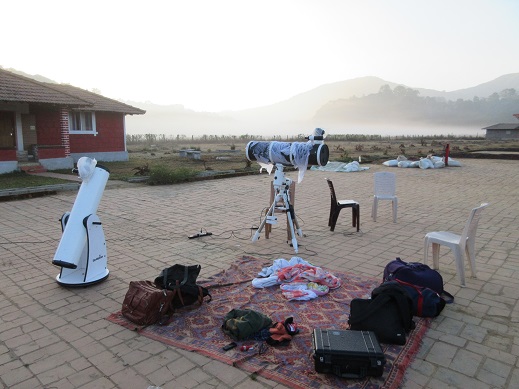
But what is happening with the output generated from amateur astronomy in India, this is a topic which has been very unsatisfactory for me. I have spent many hours thinking how it needs to be changed. Astronomy here in clubs is mainly at a hobby level, people here are not able to give more time for it as would someone in another active country; in clubs it is only lectures, sky observations, Messier Marathons, and above all astrophotography. Every newcomer wants to click photos of the night sky. I am someone who realized at an early age my sole purpose is to encourage people to do something new and something that is of "use" to the fraternity, things like ccd imaging, or even get fascinated by astrosketching versus astrophotography. We need to instigate everyone, newcomers & tenured ones, towards "giving back" to the astro community. We have much to learn & advance to. Those veteran amateurs like Albert Jones & other names I mentioned above who only knew how to do astronomy with utmost sincerity have set themselves as an example that the more they give us the more we see astronomy is testing them for reaching out to its depths.
In my rating, amateur astronomy in India needs to rise up from hobby level to something more significant, given of our potential in form of hundreds
of amateurs. It´s a shame that people can even have space for mere political mindset when doing astronomy, among any area of life. As of now I think it´s only a couple of us in the vast Indian astronomical population who're chasing astronomy more than a hobby.
